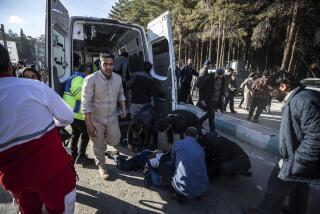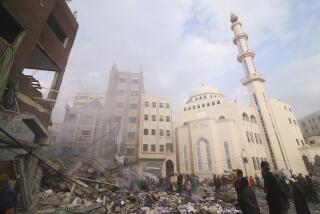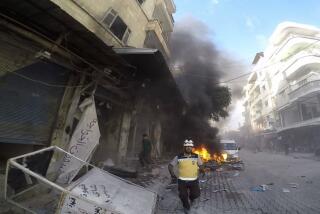Bomb Attacks Persist in Iraq
- Share via
BAGHDAD — A suicide bomber on Sunday plowed his vehicle into a tent packed with mourners at a Kurdish funeral in the northern city of Tall Afar, killing at least 25 people and wounding 30 others as insurgents continued their campaign of violence.
The onslaught has included more than 20 car bombings since Thursday, when Iraqi lawmakers concluded months of tense negotiations by approving a Cabinet of three dozen ministers. It is the country’s first elected government in decades. At least 100 Iraqis and 11 U.S. troops have been killed in the last four days.
The funeral attack was among six bombings across the country Sunday. At least 10 Iraqis died in the other insurgent attacks the same day, and a video aired showing an Australian man recently taken hostage.
Iraqi and U.S. forces also arrested 11 suspects believed to have been involved in last year’s kidnapping and presumed slaying of Margaret Hassan, a British aid worker.
News agencies reported that a British Embassy spokesman confirmed that Iraqi and American forces had recovered personal items believed to have belonged to Hassan in a raid south of Baghdad.
The car bombing in Tall Afar struck a large tent where the funeral was being held for Taleb Wahab, an official with the Kurdish Democratic Party who had been killed by insurgents Thursday, said a Kurdish official quoted by Reuters news agency. The vehicle exploded at about 8 p.m.
Tall Afar, west of Mosul near the border with Syria, has seesawed between U.S. and insurgent control for months. American troops laid siege to the city last fall, claiming it was a key way station for militants crossing from Syria.
Insurgents have largely targeted the country’s newly empowered Shiite Muslim and Kurdish populations along with Iraq’s fledgling army and police force. Sunnis, the former ruling minority, have complained about their marginalization in the new Iraqi political order.
On Sunday, Iraqi national security advisor Mowaffak Rubaie said the new government was determined to quell violence by the end of this year.
“I think we are winning -- on the winning course, there is no doubt about it. The level of violence is not measured only by the number of explosions every day, or the number of casualties,” he said in an interview with CNN’s “Late Edition.”
He added: “There is no shadow of doubt in my mind that by the end of the year, we would have achieved a lot, and probably the back of the insurgency has already been broken.”
Last week, Air Force Gen. Richard B. Myers, chairman of the Joint Chiefs of Staff, said rebels were attacking 50 or 60 times a day in Iraq -- about the same as a year ago. But Myers also said many of the attacks had missed their targets.
Among the attacks that rocked Iraq on Sunday:
* In Baghdad, a car bomb in the Zaafarania neighborhood killed four Iraqi civilians and wounded 12, police said.
* Another bomb targeted an American patrol in western Baghdad, killing one Iraqi and wounding 10 others.
* In the eastern part of the capital, insurgents ambushed a police checkpoint, killing five officers and wounding one.
* An attempted car bombing at the entrance to a U.S. base in eastern Baghdad failed early Sunday morning when the Kia sedan exploded 15 feet short of the first barrier guarding the base. American soldiers rescued the driver from the burning vehicle. According to a U.S. military statement, the driver said he had been forced to carry out the mission to save family members kidnapped by militants.
On Arabic satellite television, a new video was aired showing an Australian kidnapped by militants. The video shows a disheveled man in his 50s sitting on the floor, flanked by two masked gunmen. According to news reports, the man identified himself as Douglas Woods, an engineer working on construction projects with the U.S. military.
Police in Saddam Hussein’s hometown of Tikrit placed the city under curfew from 10 p.m. to 5 a.m. until further notice, and increased checkpoints and street patrols. Police Lt. Col. Amer Abdel Majid said the decision to impose the curfew had followed information linking car bombings to the area.
Despite the violence, Rubaie said U.S. and other foreign troops in Iraq would probably start pulling out in large numbers by the middle of next year.
“I will be very surprised if they [U.S. and other foreign troops] don’t think very seriously of starting pulling out probably by the end of the first half of next year,” he said on CNN.
When pressed on how many were expected to leave, Rubaie said that depended on how quickly Iraqi troops could be trained and armed.
Twenty-five months after the invasion to topple Saddam Hussein, the United States has 138,000 troops in Iraq battling a relentless insurgency and training Iraqi security forces.
The United States has not given a timetable for withdrawing its troops.
President Bush has said repeatedly that the American military will leave only when its job is finished and Iraqi forces can take over.
*
Special correspondents in Mosul and Tikrit contributed to this report and Times wire services were used in compiling it.
More to Read
Sign up for Essential California
The most important California stories and recommendations in your inbox every morning.
You may occasionally receive promotional content from the Los Angeles Times.













